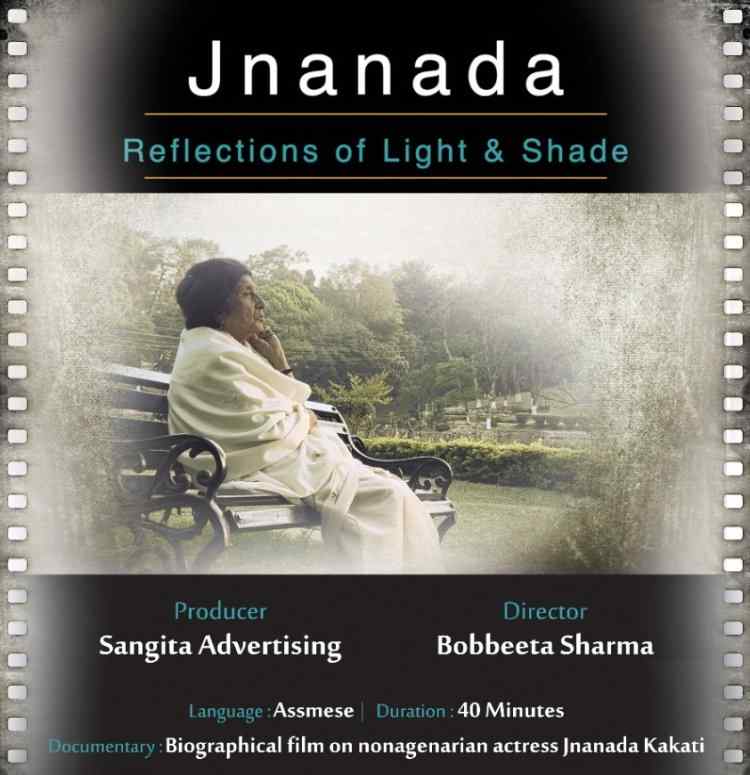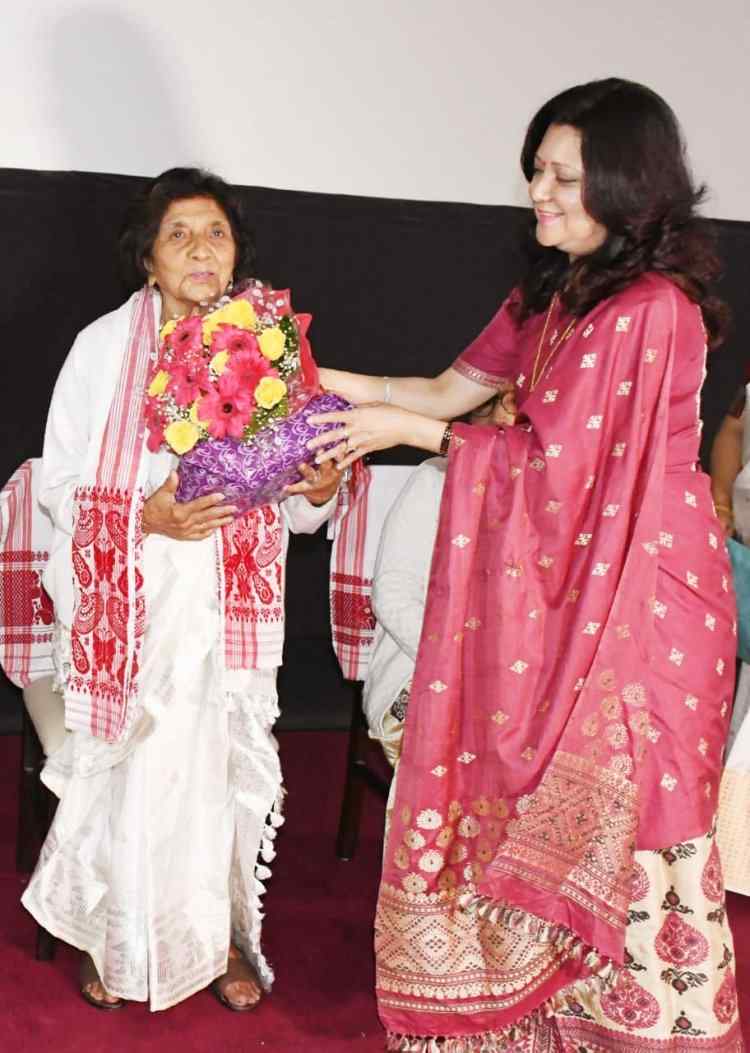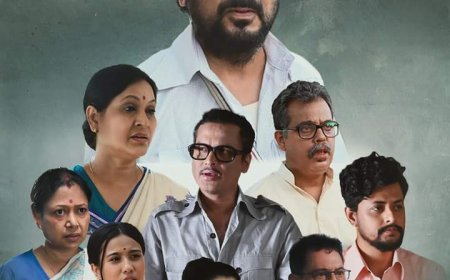Documentary on legendary Assamese Actress , Jnanada Kakati

Noted film critic Prantik Deka writes on the legacy of legendary Assamese actress Jnanada Kakati, whose biographical documentary, Jnanada: Reflections of Light and Shade was screened at the Anuradha Cineplex, Guwahati.
The legacy of legendary Assamese actress Jnanada Kakati is celebrated in a new biographical documentary – Jnanada: Reflections of Light and Shade, which was screened at the Anuradha Cineplex on March 19. The special screening was done in the presence of Jnanada Kakati, and inaugurated by veteran actress Aroti Barua, along with noted actress Bina Goswami of 'Srimati Mohimamayee' fame.
Many and varied are the experiences of this iconic actress who has spent 91 Springs of her life with all it's ups and downs, but even after that, she is indomitable, restless, evergreen. Even today, she gets nostalgic recalling those golden memories that have been left behind, memories that are embedded in her mind, memories that are such a treasured possession. Memories have not been able to deceive her mind even today.
The rich history of Assamese cinema is enriched with the footsteps of a number of beautiful, elegant and deeply talented actresses. Jnanada Kakati is one of those rare artists in Assamese cinema who epitomised cosmopolitan refinement. Her westernised decency, beauty and graceful acting is still fresh in the memory of the audience. Her classic looks with beautiful, expressive eyes, pointed nose, a very attractive face, mesmerizing voice and a demure posture, so full of manifold emotions, captivated the audiences with a sense of sweet euphoria.
Bobbeeta Sharma's 40-minute long documentary traces the cinematic journey of Jnanada Kakati, the living embodiment of grace, courage and character in the face of tremendous adversity. What we see and hear in the documentary film is Jnanada Kakati's life in cinema as she recollects and narrates it eloquently in interviews shot in Shillong. Living under the shadow of the lovely, cosy old house, tastefully done up, amidst the verdant green in Shillong where she has spent most of the happiest days of her life, she still maintains an amazing amount of enthusiasm, forthrightness and an incredibly positive attitude.

Image: Jnanada Kakati with the director, Bobbeeta Sharma
It is generally seen that the acting career of many actresses comes to an end post marriage. Jnanada Kakati acted in films only after her marriage. It was while she was on a visit to Guwahati after marriage, having a blissful time with her husband Lohit Kakati, Tilak Das, a well-known musician, spotted Jnanada Kakati at the sandbanks near Kachari Ghat in Uzan Bazar, and offered her the lead role in his first film as a producer – 'Parghat'. Gyanda Kakati came forward to act in the film with the consent of her husband Lohit Kakati. Directed by Prabin Phukan, the film, released in 1949, featured the legendary actor Chandra Phukan opposite her.
In 'Jnanada: Reflections of Light and Shade', the nonagenarian artist described her foray into films as an 'unplanned' step, and that it was at a time when the society was overwhelmingly conservative and insular, and working in films was considered profane, especially for a married woman.
Her parents even warned her of disowning her when she was offered her first film role.
It needed to be mentioned at the outset that Jnanada Kakati's career in movies wouldn't have happened without the constant support and encouragement of her husband Lohit Kakati, who was himself a skillful singer and flute player. It was her husband, who always accompanied her to different shooting locales, nurtured her acting interests, and encouraged her growth as an artiste.
During those times, most of the indoor shoots of Assamese films were done in the studios in Kolkata with the collaboration of local technicians. After 'Parghat', she acted in a number of films as the leading heroine. The films are Phani Sharma's 'Piyali Phukan' (1955, the first Assamese film to be honoured with the Certificate of Merit at the National Awards), Anwar Hussain's 'Sarapat' (1956), Bhaben Das directed 'Lakhimi' (1957), Nip Barua's 'Ronga Police' (1958, the first Assamese film to win the President’s Silver Medal for Best Feature Film at the 6th National Film Awards), Prabhat Mukherjee directed 'Purberun' (1959, winner of the President’s Silver Medal for Best Feature Film and the first Assamese film to be exhibited at the Berlin International Film Festival), Saila Barua's 'Saknoiya' (1959), Phani Sharma's 'Puwati Nishar Sapon' (1959), Nip Barua's 'Narakasur' (1961), Dev Kumar Basu's 'Shesh Bisar' (1971), Jiten Sarma's 'Upar Mahala' (1972), Wisekurni Bora's 'Priyajon' (1993) and Bidyut Chakravarty's 'Rag-Birag' (1996, inaugural film in Indian Panorama, IFFI, winner of the Indira Gandhi National Award for Best First Film of a Director, National Awards for Best Cinematography and Best Editor, 1997). She also made a name for herself in the Bengali film industry with her captivating performances. Her Bengali films are 'Nilachaley Mahaprabhu' (opposite the noted Bengali actor Ahindra Choudhury), 'Garer Math', 'Barma' etc.
Among all these films, her character in the path-breaking celluloid drama 'Puberun' was the most powerful and memorable one. No film lover can ever possibly forget the lively performance of Jnanada Kakati as the film's heroine Meghali in a wonderfully crafted movie.
Skillfully directed by Prabhat Mukherjee, the film illustrates the heartwarming story about the undying affection of mother and child. The film shows how a mother extends her love for her child to that of the children of a Christian orphanage. The director presents a universal truth in the film – All children in the world are the same, all children are equal. 'Puberun' was invited to participate in the competition section of the prestigious Berlin International Film Festival in the year 1960. The film's heroine Jnanada Kakati, director Prabhat Mukherjee and one of the producers, the Jorhat-based Paji Das went to Berlin to attend the Berlin Film Festival, considered as one of the world's most celebrated and oldest film festivals.
"When I received the letter of invitation to the Berlin International Film Festival, I was so excited that I ran wearing my hawaii chappals to my husband's office to convey him the news! I was almost out of breath and my husband had to give me a glass of water to calm me down," recalls the actress in the documentary film. Immediately, the then Chief Secretary, Dharmananda Das, and Finance Minister Fakhruddin Ali Ahmed, who later became India’s President, arranged for the expenses of Jnanada Kakati's journey to Berlin. Jnanada Kakati was there for a month.
Much like in Assam, Jnanada Kakati received immense appreciation abroad for her role in 'Puberun'. The Berlin Festival is, without doubt, a high point of her professional career. The cream of the Hollywood film industry was present at the Berlin festival. Jnanada Kakati fondly reminisces about that rare opportunity of hobnobbing with the best of actors, actresses, filmmakers from all over Europe and Hollywood. She also got the opportunity to interact with major Hollywood artistes like Cary Grant, Ava Gardner, Sophia Lauren, etc, closely. Cary Grant even took her to the dance floor. Jnanada Kakati gave interviews for BBC Radio on her way to London besides German TV, Australian TV, etc. The 45-minute-long interview for BBC, conducted by the London-based Indian Berry Sarbadhikari, was broadcast on a Bengali channel. Kakati, who has received everyone's love and affection, still reminisces those days.
An artiste with an exceptional range and ability, Jnanada Kakati made the State and the country proud by becoming the first Assamese actress to receive the President's Silver Medal from the then President of India, Sarvapalli Radhakrishnan in recognition of her work in 'Puberun' in 1960.
The documentary also presents a beautifully shot and edited clip from the classic 'Puberun', showcasing the happy moments of a newly married couple amidst the pristine natural beauty of Shillong, revealing an invigorating piece of creative work.
After 'Puberun', she caught the attention of a number of eminent filmmakers, including Bimal Sen, who offered her the lead role of a dumb lady in his pet project 'Tothapi'. Then the shooting of her first Assamese film 'Parghat' was going on in a studio in Kolkata. She was a young woman then, newly married. Many also scared her that working in Kolkata and sticking to acting might cause marital discord. Her husband had no objection, but her parents objected to her acting in films. She got offers to act in several Bengali films but had to reject them for various reasons at the time. Her two children Juri and Utpal were also young then, and needed her time and attention. Renowned filmmaker Pramathesh Chandra Barua, too, offered her a role for a movie which was to be like 'Joymoti', but unfortunately he passed away before he could start the movie. She met with an unfortunate accident just before the shooting of another film called 'Shesher Kobita', and as such, she was also expecting at that time. Most importantly, Bimal Roy could never get her out of his mind! So, he offered her the leading role of the heroine in his Hindi movie, now considered a classic, 'Bandini'. But once again, she could not accept that invitation due to personal reasons. Later, that role was played by Nutan. But despite such setbacks, she was never distracted, and continued with her acting journey, with her career continuing to go from strength to strength.
She considers herself very fortunate to have acted with the famous Bengali actor Ahindra Choudhury in 'Nilachaley Mahaprabhu'. Ardhendu Mukherjee taught Jnanada Kakati the art of shedding tears while acting during the shooting of 'Garer Math'.
Many seems to have forgotten this great actress who is currently passing through 91 Springs of her life. She still laments that she has never done anything like the much-lauded role in 'Puberun'.
It's astonishing, and a matter of great regret that filmmakers never felt the need to cast Jnanada Kakati in any film other than this. Even though so many films were being made at that time. Of course, Bidyut Chakravarty did cast her in his National Award-winning 'Rag-Birag'. And it has been more than 26 years since this film was released!
Ever the optimist, she still longs to act in films, as she spends her days at her home in Oakland, Shillong, ruminating about past events.
As a child, she loved acting, dance and music, even though she was under the strict rule of her parents, who always emphasised on studies. She used to watch her father perform on stage while hiding backstage at the Asom Club in Shillong, even as she tried to capture the meaning behind the words and performances. After settling down permanently in the Laban locality of Shillong, her father Deben Das, a reputed theatre artiste, often participated in plays staged at the Asom Club in Shillong. It was here that she developed a love for acting, even harbouring a desire to perform on the stage. Her mother Biraja Das was a highly skilled weaver. Her mother often used to sing while working on the traditional loom. Sitting nearby, Jnanada Kakati tried to learn by listening intently to those songs. So she got inspired to learn acting from her father and music from her mother. While studying in Laban Assamese School, she took an active part in songs, recitations, plays, etc, winning numerous awards.
In one of her functions, Kalaguru Bishnu Prasad Rabha was so impressed to see Jnanada Kakati's dance in the play 'Sati Beula' that he visited their house the very next day! Bishnu Prasad Rabha started teaching dance to Jnanada.
At the age of 10-12 years, Jnanada Kakati danced into the hearts of all who saw her performing a dance to Rupkonwar Jyoti Prasad Agarwala's 'Gose Gose Pati Dile Phulore Xorai' for the first time at the Asom Club. Bishnu Prasad Rabha, who was also present on the occasion, praised her immensely and encouraged her toward her dreams.
It's because of her incredibly beautiful voice that Jnanada Kakati got the job of the announcer at the Akashvani Shillong-Guwahati centre in 1948. She was the first announcer of that centre. She possessed a sweet voice and she always sang with a lot of feeling. Jnanada Kakati was also an accredited singer of All India Radio, having sung many popular songs.
When she was once asked by someone as to why she has not been recommended for the Sangeet Natak Akademi Award, Jnanada Kakati responded by saying that she never worked seeking awards!
Bobbeeta Sharma had initially interviewed Jnanada Kakati for her much acclaimed book – 'The Moving Image & Assamese Culture – Joymoti, Jyotiprasad Agarwala and Assamese Culture' in 2012, but it was on audio only and not in the video format. As Assamese cinema is close on the heels of turning 90 (it is in its 88th year), she strongly felt that veteran artistes like 91-year-old Jnanada Kakati's reflections and rich experience need to be documented for posterity. This film is definitely an invaluable document and an important step towards documenting the lives of famous Assamese movie stars of the bygone era.
It is also interesting to note that the documentary has featured Atanoo Baruwa in an endearing interaction with Jnanada Kakati. Atanoo Baruwa had enacted the role of Jnanada Kakati's son in the landmark film 'Puberun'. In another heart-warming moment, Ruma Sarma, popularly known as Baby Ruma, who appeared with Jnanada Kakati in three of her films, 'Saknoiya', 'Puberun' and 'Sorapat', also interacted with her. The documentary also featured an interaction with noted film actor Pranjal Saikia with whom Jnanada Kakati had acted in 'Priyajon' and 'Rag-Birag'.
A host of cultural personalities attended the screening of 'Jnanada: Reflections of Light and Shade', including Santwana Bordoloi, Mridula Baruah, Paran Borbora, Ahsan Muzid, Archana Bhattacharjee, Prabin Hazarika, Kopil Bora, Malobika Bora, Utpal Datta, Mridula Das, Maini Mahanta, Swapnanil Baruah and former minister. Hemoprova Saikia, and many others. Lima Das, the leading actress of the critically acclaimed 'Aamis', felicitated Aroti Barua and Bina Goswami.
The documentary has been produced under the banner of Sangita Advertising. The film's executive producers are Chinmoy Sharma and Bobbeeta Sharma. Its creative director and editor is Ravindra Badgaiyan. The script is written by Jimoni Choudhury. The camerawork has been done by Sharad Kumar Verma and edit packaging is by Bhabesh Baishya.
***
What's Your Reaction?

































































